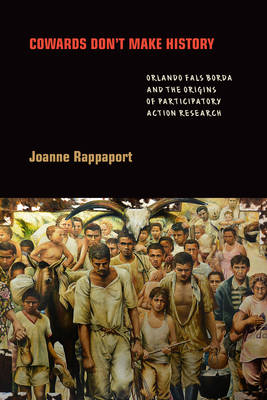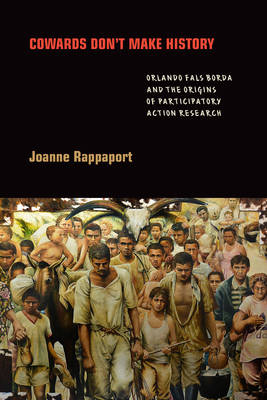
- Afhalen na 1 uur in een winkel met voorraad
- Gratis thuislevering in België vanaf € 30
- Ruim aanbod met 7 miljoen producten
- Afhalen na 1 uur in een winkel met voorraad
- Gratis thuislevering in België vanaf € 30
- Ruim aanbod met 7 miljoen producten
Zoeken
Cowards Don't Make History
Orlando Fals Borda and the Origins of Participatory Action Research
Joanne Rappaport
Hardcover | Engels
€ 164,95
+ 329 punten
Uitvoering
Omschrijving
In the early 1970s, a group of Colombian intellectuals led by the pioneering sociologist Orlando Fals Borda created a research-activist collective called La Rosca de Investigación y Acción Social (Circle of Research and Social Action). Combining sociological and historical research with a firm commitment to grassroots social movements, Fals Borda and his colleagues collaborated with indigenous and peasant organizations throughout Colombia. In Cowards Don't Make History Joanne Rappaport examines the development of participatory action research on the Caribbean coast, highlighting Fals Borda's rejection of traditional positivist research frameworks in favor of sharing his own authority as a researcher with peasant activists. Fals Borda and his colleagues inserted themselves as researcher-activists into the activities of the National Association of Peasant Users, coordinated research priorities with its leaders, studied the history of peasant struggles, and, in collaboration with peasant researchers, prepared accessible materials for an organizational readership, thereby transforming research into a political organizing tool. Rappaport shows how the fundamental concepts of participatory action research as they were framed by Fals Borda continue to be relevant to engaged social scientists and other researchers in Latin America and beyond.
Specificaties
Betrokkenen
- Auteur(s):
- Uitgeverij:
Inhoud
- Aantal bladzijden:
- 312
- Taal:
- Engels
Eigenschappen
- Productcode (EAN):
- 9781478009986
- Verschijningsdatum:
- 23/10/2020
- Uitvoering:
- Hardcover
- Formaat:
- Genaaid
- Afmetingen:
- 152 mm x 229 mm
- Gewicht:
- 589 g

Alleen bij Standaard Boekhandel
+ 329 punten op je klantenkaart van Standaard Boekhandel
Beoordelingen
We publiceren alleen reviews die voldoen aan de voorwaarden voor reviews. Bekijk onze voorwaarden voor reviews.








